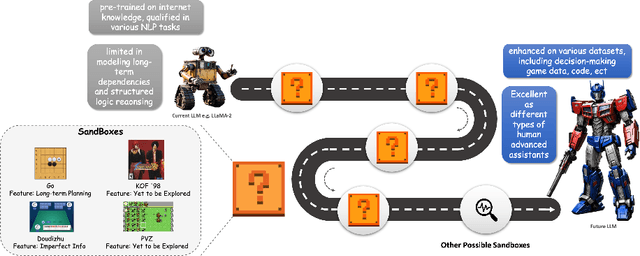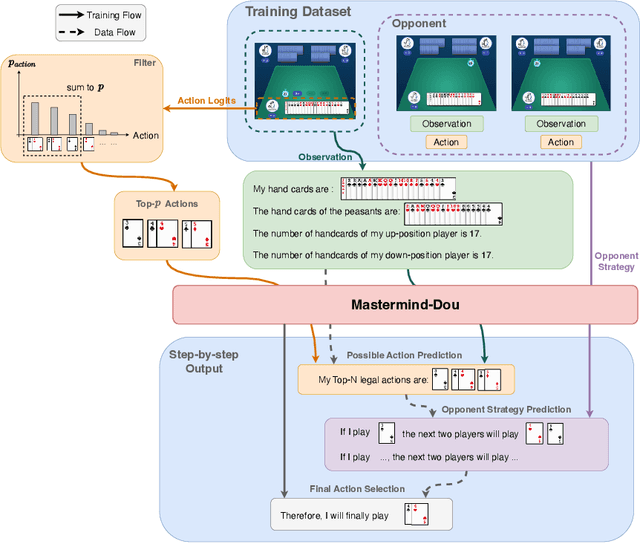Shuai Hu
One Model for All Tasks: Leveraging Efficient World Models in Multi-Task Planning
Sep 09, 2025Abstract:In heterogeneous multi-task learning, tasks not only exhibit diverse observation and action spaces but also vary substantially in intrinsic difficulty. While conventional multi-task world models like UniZero excel in single-task settings, we find that when handling large-scale heterogeneous environments, gradient conflicts and the loss of model plasticity often constrain their sample and computational efficiency. In this work, we address these challenges from two perspectives: the single learning iteration and the overall learning process. First, we investigate the impact of key design spaces on extending UniZero to multi-task planning. We find that a Mixture-of-Experts (MoE) architecture provides the most substantial performance gains by mitigating gradient conflicts, leading to our proposed model, \textit{ScaleZero}. Second, to dynamically balance the computational load across the learning process, we introduce an online, LoRA-based \textit{dynamic parameter scaling} (DPS) strategy. This strategy progressively integrates LoRA adapters in response to task-specific progress, enabling adaptive knowledge retention and parameter expansion. Empirical evaluations on standard benchmarks such as Atari, DMControl (DMC), and Jericho demonstrate that ScaleZero, relying exclusively on online reinforcement learning with one model, attains performance on par with specialized single-task baselines. Furthermore, when augmented with our dynamic parameter scaling strategy, our method achieves competitive performance while requiring only 80\% of the single-task environment interaction steps. These findings underscore the potential of ScaleZero for effective large-scale multi-task learning. Our code is available at \textcolor{magenta}{https://github.com/opendilab/LightZero}.
Empowering LLMs in Decision Games through Algorithmic Data Synthesis
Mar 18, 2025



Abstract:Large Language Models (LLMs) have exhibited impressive capabilities across numerous domains, yet they often struggle with complex reasoning and decision-making tasks. Decision-making games, which inherently require multifaceted reasoning logic, serve as ideal sandboxes for evaluating and enhancing the reasoning abilities of LLMs. In this work, we first explore whether LLMs can master complex decision-making games through targeted post-training. To this end, we design data synthesis strategies and curate extensive offline datasets from two classic games, Doudizhu and Go. We further develop a suite of techniques to effectively incorporate this data into LLM training, resulting in two novel agents: Mastermind-Dou and Mastermind-Go. Our experimental results demonstrate that these Mastermind LLMs achieve competitive performance in their respective games. Additionally, we explore whether integrating decision-making data can enhance the general reasoning abilities of LLMs. Our findings suggest that such post-training improves certain aspects of reasoning, providing valuable insights for optimizing LLM data collection and synthesis strategies.
PsyDI: Towards a Personalized and Progressively In-depth Chatbot for Psychological Measurements
Jul 22, 2024Abstract:In the field of psychology, the static nature and lack of customization of psychological test scales, along with the challenge of quantifying psychological indicators, have long been critical issues. Despite numerous attempts to use AI to address psychological challenges, a dynamically interactive psychological test has yet to emerge. In contrast to traditional psychological assessment methods, we propose PsyDI, a multi-modal, interactive, and customized chatbot for psychological assessments, using the Myers-Briggs Type Indicator (MBTI) as an example. PsyDI initiates with user-related multi-modal information, then engaging in customized interaction to discern the user's MBTI type based on their multiple rounds of responses. Despite these advancements, accurately quantifying absolute value of psychological indicators remains challenging. To tackle such difficulty, we introduce the PsyDI framework that trains LLMs to discern the relative magnitude of psychological traits rather than their absolute values. Through various experiments, we demonstrate the effectiveness of the training techniques proposed in PsyDI on various datasets, and we have also launched its web version, reaching about ~3k accesses. Additionally, comprehensive post-deployment data analysis has provided profound insights into the implications and applications of PsyDI, demonstrating its potential to serve as a general framework for psychological assessment.
ReZero: Boosting MCTS-based Algorithms by Just-in-Time and Speedy Reanalyze
Apr 28, 2024Abstract:MCTS-based algorithms, such as MuZero and its derivatives, have achieved widespread success in various decision-making domains. These algorithms employ the reanalyze process to enhance sample efficiency, albeit at the expense of significant wall-clock time consumption. To address this issue, we propose a general approach named ReZero to boost MCTS-based algorithms. Specifically, we propose a new scheme that simplifies data collecting and reanalyzing, which significantly reduces the search cost while guarantees the performance as well. Furthermore, to accelerate each search process, we conceive a method to reuse the subsequent information in the trajectory. The corresponding analysis conducted on the bandit model also provides auxiliary theoretical substantiation for our design. Experiments conducted on Atari environments and board games demonstrates that ReZero substantially improves training speed while maintaining high sample efficiency. The code is available as part of the LightZero benchmark at https://github.com/opendilab/LightZero.
Hybrid Convolutional and Attention Network for Hyperspectral Image Denoising
Mar 15, 2024



Abstract:Hyperspectral image (HSI) denoising is critical for the effective analysis and interpretation of hyperspectral data. However, simultaneously modeling global and local features is rarely explored to enhance HSI denoising. In this letter, we propose a hybrid convolution and attention network (HCANet), which leverages both the strengths of convolution neural networks (CNNs) and Transformers. To enhance the modeling of both global and local features, we have devised a convolution and attention fusion module aimed at capturing long-range dependencies and neighborhood spectral correlations. Furthermore, to improve multi-scale information aggregation, we design a multi-scale feed-forward network to enhance denoising performance by extracting features at different scales. Experimental results on mainstream HSI datasets demonstrate the rationality and effectiveness of the proposed HCANet. The proposed model is effective in removing various types of complex noise. Our codes are available at \url{https://github.com/summitgao/HCANet}.
LightZero: A Unified Benchmark for Monte Carlo Tree Search in General Sequential Decision Scenarios
Oct 12, 2023



Abstract:Building agents based on tree-search planning capabilities with learned models has achieved remarkable success in classic decision-making problems, such as Go and Atari. However, it has been deemed challenging or even infeasible to extend Monte Carlo Tree Search (MCTS) based algorithms to diverse real-world applications, especially when these environments involve complex action spaces and significant simulation costs, or inherent stochasticity. In this work, we introduce LightZero, the first unified benchmark for deploying MCTS/MuZero in general sequential decision scenarios. Specificially, we summarize the most critical challenges in designing a general MCTS-style decision-making solver, then decompose the tightly-coupled algorithm and system design of tree-search RL methods into distinct sub-modules. By incorporating more appropriate exploration and optimization strategies, we can significantly enhance these sub-modules and construct powerful LightZero agents to tackle tasks across a wide range of domains, such as board games, Atari, MuJoCo, MiniGrid and GoBigger. Detailed benchmark results reveal the significant potential of such methods in building scalable and efficient decision intelligence. The code is available as part of OpenDILab at https://github.com/opendilab/LightZero.
 Add to Chrome
Add to Chrome Add to Firefox
Add to Firefox Add to Edge
Add to Edge